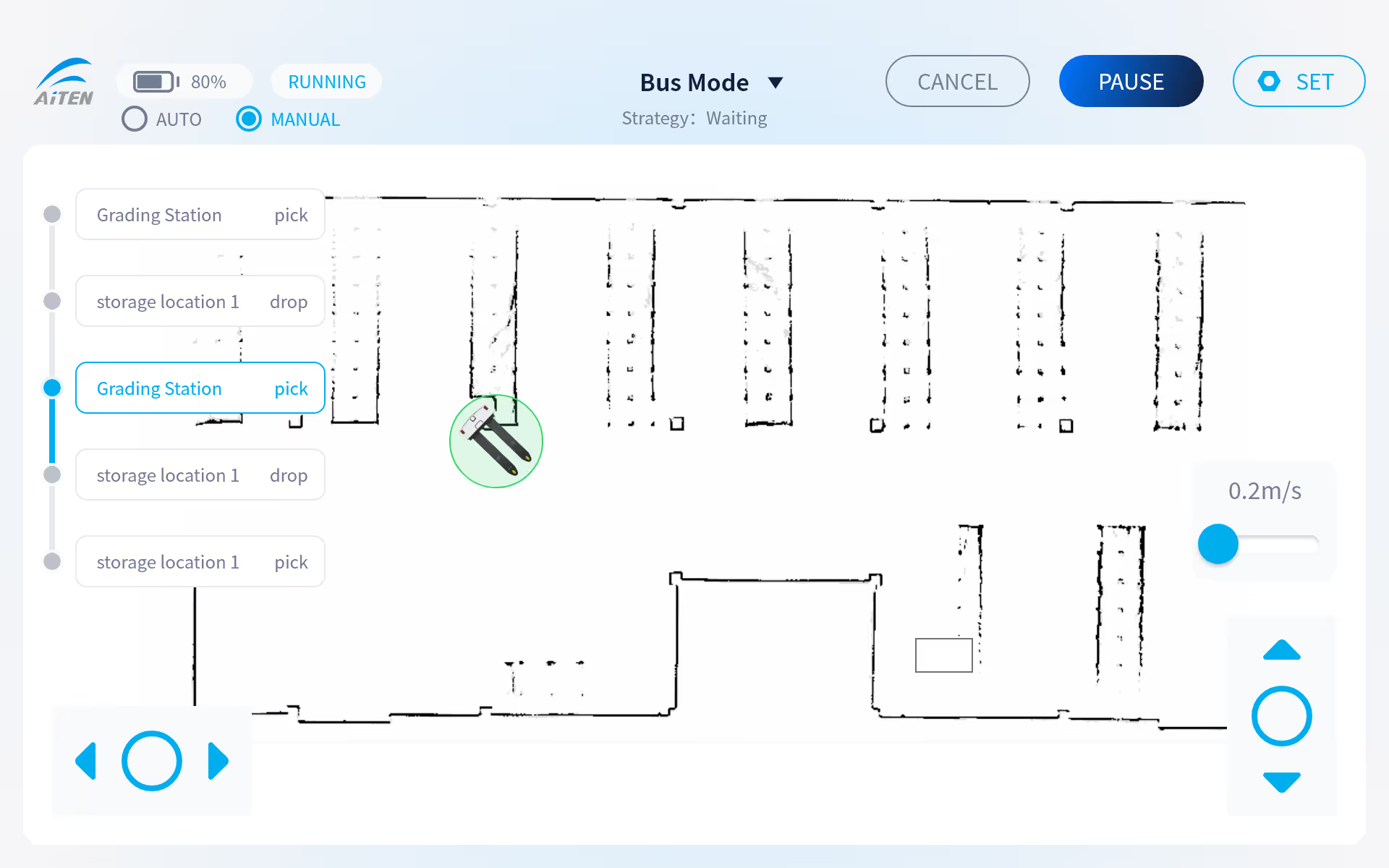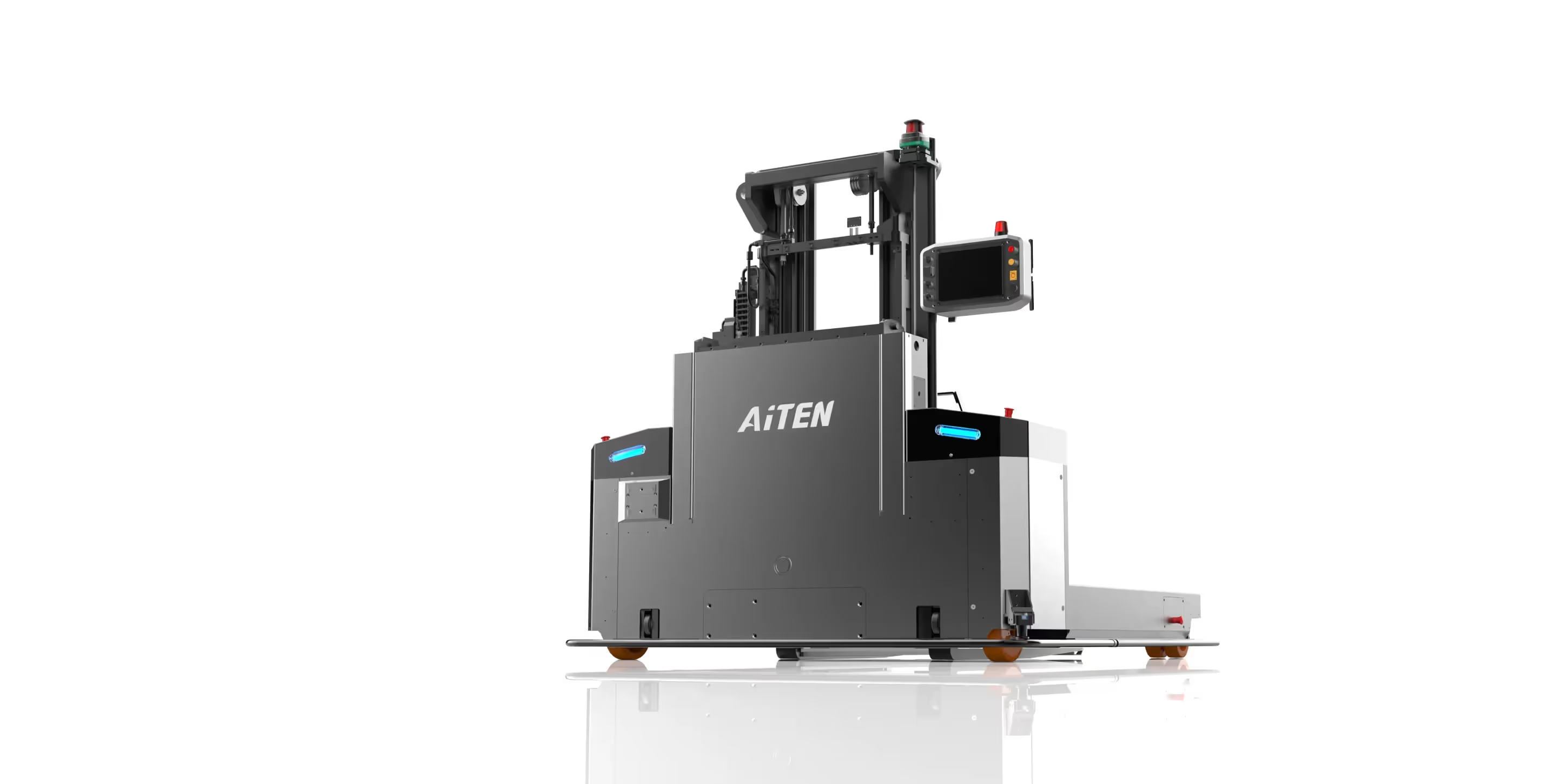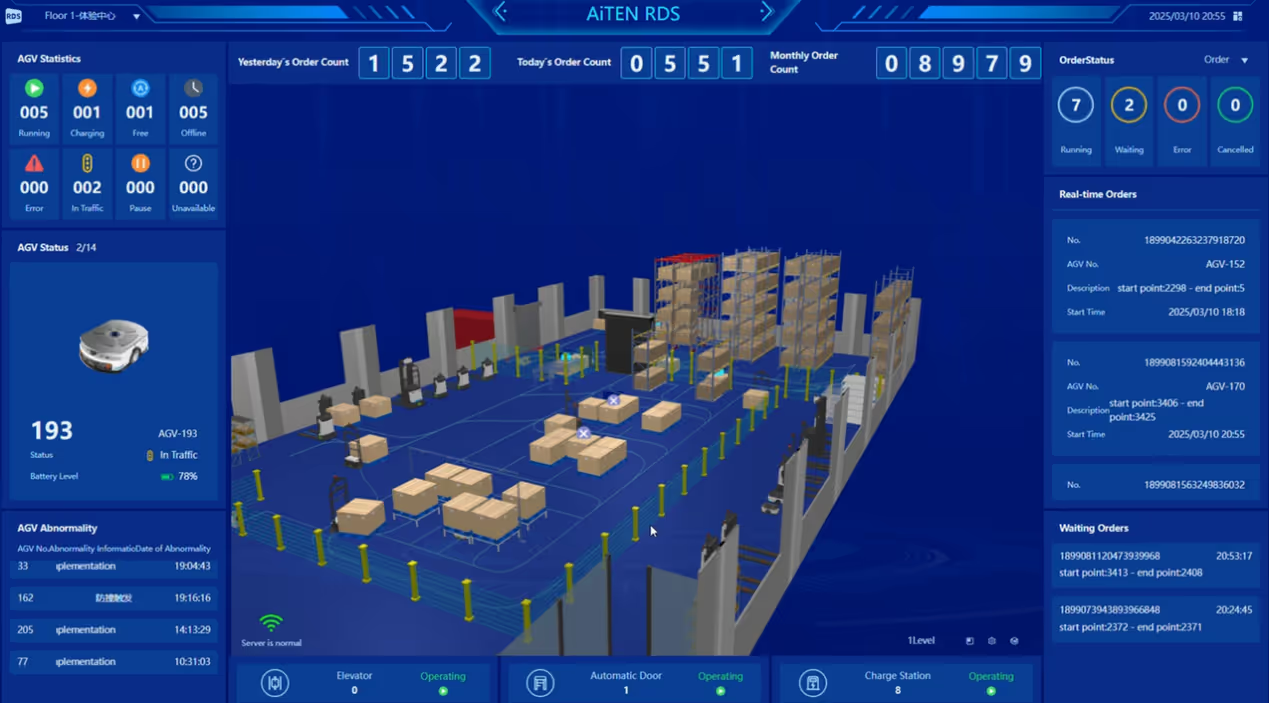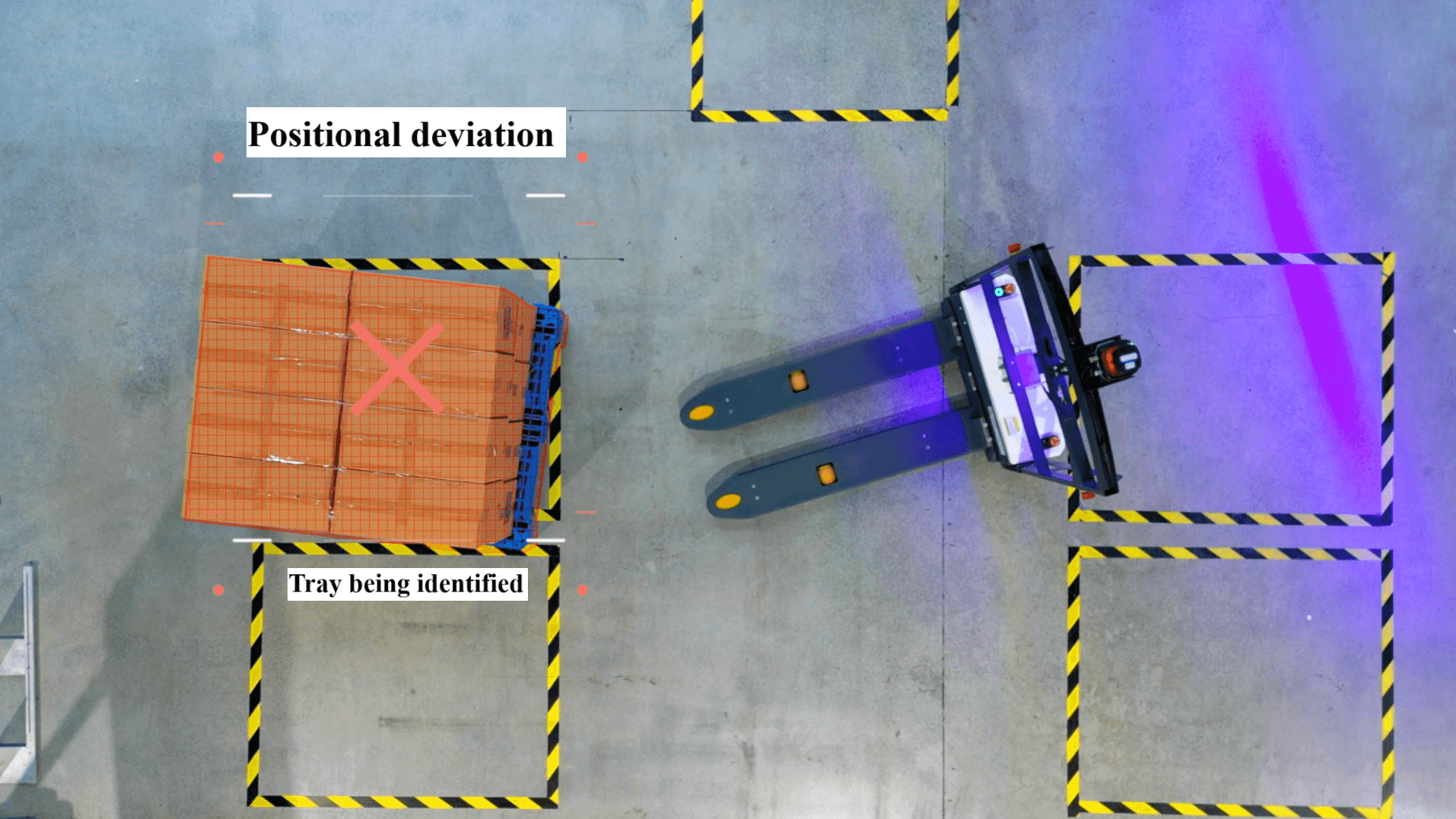AGV 지게차 시스템 가이드: 스마트 팩토리 물류의 재정의

지능형 제조 혁신과 업그레이드의 물결 속에서 AGV(무인 운반차) 무인 지게차 시스템은 단일 장치에서 풀체인 지능형 핸들링 솔루션으로 진화했습니다. 하드웨어 아키텍처, 소프트웨어 알고리즘, 시나리오 적응을 통합한 이 복잡한 시스템은 '인식-결정-실행'의 폐쇄 루프 기능으로 공장과 물류창고에서 물류 효율의 경계를 재정의하고 있습니다.
시스템 아키텍처
1. 하드웨어 레이어: 모듈형 인텔리전트 캐리어
- 모바일 플랫폼: 대표적인 모델로는 강력한 리프팅 기능을 갖춘 에이텐 로보틱스의 APx20 양면 팔레트 지게차, TP100 로봇, ARV15 전방향 운반 및 적재 로봇이 있습니다.

- 인식 시스템: 라이더(정밀한 거리 측정이 가능하지만 강한 빛의 간섭에 취약함), 시각 카메라(물체 유형 인식, 저조도 조건에서 제한됨), 초음파 센서(근거리 사각지대 감지)를 포함한 다중 센서 데이터가 서로의 단점을 보완하고 장애물 인식 정확도를 향상시킵니다.
AGV(무인운반차) 실시간 장애물 회피 기술을 위한 다중 센서 융합
- 에너지 모듈: 리튬 인산철 배터리는 30분 고속 충전을 지원하며 스마트 배터리 스왑 스테이션 설계와 결합하여 내구성을 높이고 24시간 연속 작동을 가능하게 합니다.
2. 소프트웨어 계층
- 클러스터 관리 시스템: 강화 학습 알고리즘을 기반으로 100대 이상의 AGV를 동시에 배차하고 경로 충돌을 자동으로 피할 수 있습니다. 효율적인 지능형 알고리즘과 지능형 관리 기능을 사용하여 물류 자원을 정확하게 구성하고 다양한 작업을 효율적으로 배차하는 AiTEN RDS 배차 시스템. 내부 창고 상품 운송이든 지역 간 물류 유통이든 정확성을 보장하고 혼잡을 0.5% 미만으로 줄이면서 다중 기계 협업 효율성을 35%까지 높일 수 있습니다.
- 작업 할당 엔진: WMS(창고 관리 시스템)와 통합 후 주문 우선순위, 장비 부하 및 기타 매개 변수를 기반으로 실시간으로 경로를 최적화할 수 있습니다. 자동문, 엘리베이터, 컨베이어 라인과 같은 주변 장비와 원활하게 통합되어 스케줄링 시스템과 긴밀하게 통합되어 제어 명령을 핵심 제어 시스템으로 정확하게 전송하는 AiTEN의 WCS(창고 제어 시스템). 이를 통해 통합 프로세스의 자동화를 촉진하고 장치 간 높은 수준의 지능형 협업과 효율적인 운영을 달성하여 스마트 팩토리 구축의 탄탄한 기반을 마련합니다.
- 데이터 시각화 플랫폼: 이 플랫폼은 실시간 시뮬레이션을 핵심으로 하는 디지털 트윈 기술을 활용하여 물류 운영을 정밀하게 모니터링합니다. 3차원 실시간 시뮬레이션을 통해 AGV 운영 상태에 대한 직관적인 경험을 제공하여 기업의 의사 결정 최적화, 효율성 향상, 비용 절감을 지원함으로써 효율적이고 지능적인 물류 자동화 솔루션을 구축할 수 있도록 돕습니다.

핵심 기술
- 동적 탐색 및 포지셔닝
레이저 SLAM + UWB 하이브리드 내비게이션을 활용하면 환경 특징 매칭을 통해 GPS가 없는 실내 환경에서도 밀리미터 수준의 위치 파악이 가능합니다.
- 다중 차량 협업 알고리즘
개미 군집 최적화 원리에서 영감을 얻은 AGV 클러스터는 자재 부족으로 인한 가동 중단 시간을 줄이기 위해 피크 시간대에 우선순위를 자동으로 조정하는 등 작업 할당을 자율적으로 협상할 수 있습니다.
- 안전 이중화 설계
하드웨어 측면에서는 충돌 방지 센서와 비상 정지 버튼이 장착되어 있습니다. 소프트웨어 측면에서는 AI 행동 예측 알고리즘이 장애물 감지 응답 시간을 0.3초 이내로 단축합니다.
시나리오 기반 애플리케이션
- 이커머스 지능형 물류창고: '상품 대 사람' 피킹 시나리오에서 AGV 시스템은 분류 로봇과 함께 작동하여 수동 피킹보다 5배 높은 시간당 2,000건의 주문 처리 효율을 달성합니다.
- 유연한 자동차 제조: 신에너지 자동차 제조업체가 구축한 AGV 시스템은 자재 데이터 디지털화와 생산 공정의 전체 프로세스 자동화를 달성하여 배송 정확도 99.99%, 관리 효율성 35% 향상, 창고 공간 활용률 30% 증가를 보장합니다.
물류 관리가 혼란스러운 자동차 공장의 창고 활용도를 30% 향상시킨 AiTEN의 맞춤형 솔루션
- 저온 콜드 체인 배송: 저온에 강한 AGV 및 디스패치 시스템을 통해 식품 냉장 보관 시설에서 기존 작업에서 지능형 작업으로 원활하게 전환할 수 있습니다. 로봇이 작업을 완료한 후 할당된 새 작업이 없으면 자동으로 충전 구역으로 이동하여 재충전합니다. 이를 통해 에너지 소비 비용을 줄이면서 항상 작업할 수 있는 상태를 유지할 수 있습니다.
스페인의 냉장창고-AE15 지능형 무인 지게차 로봇 적용 사례
결론
AGV 무인 지게차 시스템의 가치는 '자동화된 취급 도구'의 범위를 넘어 공장 장비를 연결하고 데이터 장벽을 허무는 지능형 노드가 된 지 오래입니다. 제조 및 물류 기업에게 풀스택 기술 역량을 갖춘 AGV 시스템 솔루션을 선택하는 것은 단순한 장비 도입이 아니라 미래를 위한 디지털 인프라를 구축하는 일입니다. 5G 및 엣지 컴퓨팅과 같은 기술의 긴밀한 통합을 통해 이 시스템은 계속해서 잠재력을 발휘하여 산업용 자재 취급의 '자동화'에서 '자율 운영'으로의 진화를 주도할 것입니다.
지능형 물류 솔루션 전문 기업으로서 아이텐 로보틱스는 지속적으로 '스마트 팩토리' 시나리오에 초점을 맞춰 기술 혁신과 산업 요구를 깊이 통합해 왔으며 전 세계 200개 이상의 제조 고객에게 포괄적인 서비스를 제공해 왔습니다: 다양한 자재 취급 시나리오를 포괄하는 광범위한 자재 취급 로봇 제품 포트폴리오를 활용하고, 여러 장치 간의 효율적인 협업을 가능하게 하는 업계 수준의 지능형 스케줄링 시스템을 개발하고, 사전 판매 계획, 배포 구현 및 운영 최적화를 아우르는 포괄적인 수명주기 서비스 시스템을 제공함으로써 기업이 물류 지능 혁신을 달성하고 제조 산업의 디지털 업그레이드 및 고품질 개발을 지속적으로 강화할 수 있도록 지원합니다.









_%E7%94%BB%E6%9D%BF%201.avif)

